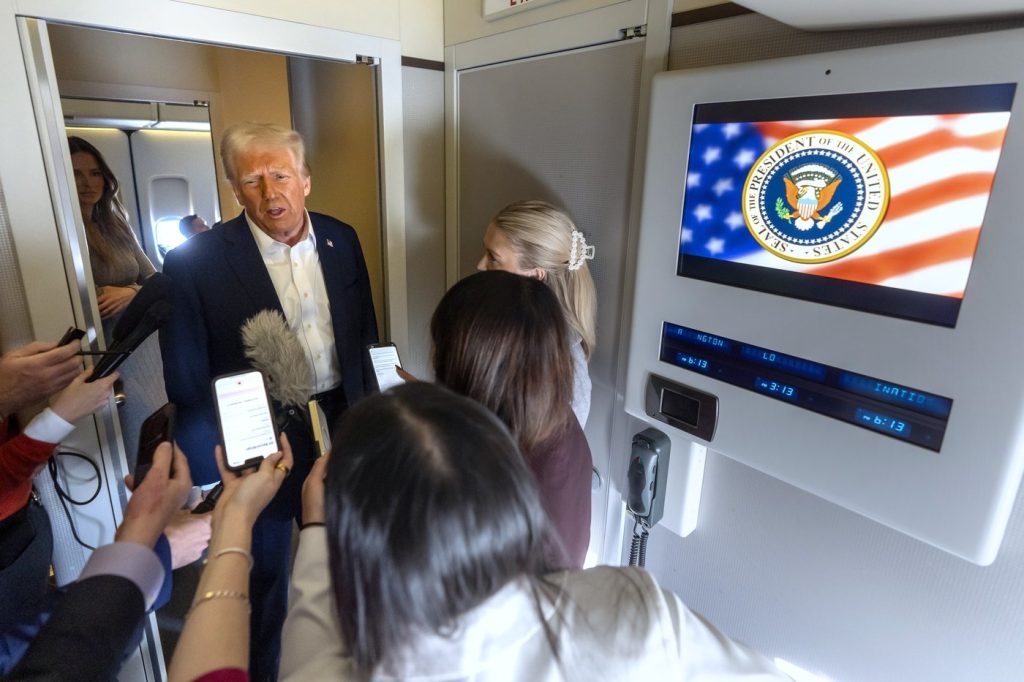ABOARD AIR FORCE ONE — President Donald Trump expressed on Saturday his desire for Jordan, Egypt, and other Arab nations to accept more Palestinian refugees from the Gaza Strip. He suggested that relocating enough of the population could create a "virtual clean slate" for the war-torn area, which he described as a "real mess." During a 20-minute Q&A session with reporters, Trump stated, "I'd like Egypt to take people," estimating that around 1.5 million individuals could potentially be relocated.
Trump also announced that he has lifted the ban imposed by his predecessor on the delivery of 2,000-pound bombs to Israel, which had been intended to minimize civilian casualties during Israel's ongoing conflict with Hamas in Gaza. "We released them today," said Trump about the bombs, adding, "They’ve been waiting for them for a long time." When questioned about his decision to remove the ban, he simply stated, "Because they bought them."
Trump, known for his pro-Israel stance, highlighted in his vision for Gaza that he spoke with King Abdullah II of Jordan earlier that day and would have a conversation with Egyptian President Abdel Fattah el-Sissi the following day. While complimenting Jordan on its acceptance of Palestinian refugees, he encouraged the king to take in more refugees, reflecting on the desolation present in Gaza by saying, "It's literally a demolition site right now. Almost everything's demolished, and people are dying there."
While Trump's proposal for the displacement of Palestinians may contradict the deeply rooted connection and identity they have with Gaza, he characterized resettlement as potentially temporary or long-term. "Something has to happen," he stated, suggesting the establishment of housing in different locations for people to "live in peace for a change."
Trump’s decision to resume the delivery of bombs marks a significant contrast to the previous administration under President Joe Biden, who had halted the shipment in May to avoid escalating the conflict further. Biden's pause in military aid was part of an effort to protect civilian lives during an aggressive Israeli campaign in Gaza, particularly in the southern city of Rafah. Following the bombing campaign, reports indicated civilian casualties and vast displacements.
Trump's actions come amidst a ceasefire between Hamas and Israel, a situation he has celebrated, as it has allowed for the release of some hostages held by Hamas and the exchange for hundreds of Palestinian prisoners by Israel. Nevertheless, negotiations regarding the second phase of the ceasefire agreement remain uninitiated. The Israeli government has warned that it may resume military operations against Hamas if the remaining hostages are not released.
Throughout his presidency, Trump has consistently promoted unconventional views regarding the future of Gaza. He previously described Gaza as possessing "phenomenal" potential due to its advantageous geographic location and climate, asserting that "some beautiful things could be done with it." However, his recent comments and policy shifts reflect a drastic approach toward managing the complex dynamics of the Israeli-Palestinian conflict.
Despite the serious implications of Trump's proposals, no immediate response has come from the office of Israeli Prime Minister Benjamin Netanyahu, marking a crucial moment in regional diplomacy. The situation continues to evolve as discussions surrounding humanitarian issues, territorial disputes, and the broader peace process remain ongoing.










